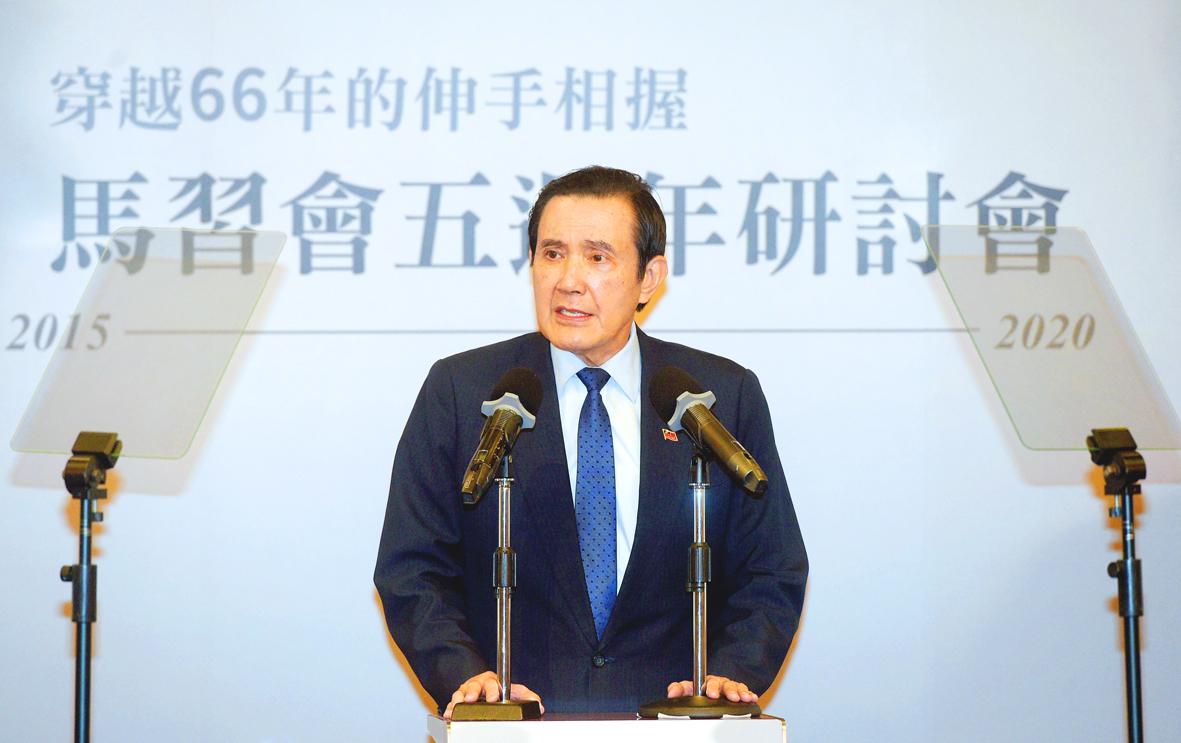President Tsai Ing-wen (蔡英文) has undermined Ma Ying-jeou’s (馬英九) peace efforts with China, the former president said yesterday, adding that Tsai could meet with Chinese President Xi Jinping (習近平), provided she agreed to the so-called “1992 consensus.”
Ma made the remarks at a forum hosted by the Ma Ying-jeou Foundation in Taipei, marking the fifth anniversary of his meeting with Xi in Singapore on Nov. 7, 2015, the first time that leaders from both sides of the Taiwan Strait had met since 1949.
“It was for building a ‘bridge for peace’ for dialogue between the two sides of the Strait,” Ma said of the meeting.

Photo: Chang Chia-ming, Taipei Times
“The summit was not an accident, but was the result of our accumulated efforts over seven years to establish a common political foundation and build mutual trust,” he said. “Mr Xi and I exerted great effort to remove many obstacles to meet at the time, and we did so to advance the cause of peace across the Strait, and this would not be forgotten by history.”
By not accepting the “1992 consensus,” the Democratic Progressive Party government has destroyed that trust and political foundation, Ma said.
“Therefore the ‘bridge for peace’ was closed down,” he said, adding that Tsai had distorted the meaning of the “consensus” to mislead people to believe it was equivalent to the “one country, two systems” framework.
The “1992 consensus,” a term former Mainland Affairs Council chairman Su Chi (蘇起) in 2006 admitted making up in 2000, refers to a tacit understanding between the Chinese Nationalist Party (KMT) and the Chinese government that both sides of the Strait acknowledge there is “one China,” with each side having its own interpretation of what “China” means.
Citing Tsai’s Double Ten National Day address last month, in which she said that Taiwan would not fear war nor would it seek it, Ma said: “We must be prepared for war, while making moves to avoid war, while seeking peace, thereby creating an advantageous situation for our side. War is not the way to solve problems.”
Ma said that for Tsai and Xi to meet, she must create a political foundation by agreeing to the “1992 consensus.”
“I hope that both sides can return to the original concept of the ‘1992 consensus,’ which would enable a meeting. I was the one who built up this ‘bridge for peace,’ in the hopes of guiding future leaders on both sides of the Taiwan Strait to walk along the ‘boulevard of peace,’” Ma said.
“I implore Tsai, if she cannot present an alternative policy, then she should accept the ‘1992 consensus,’ which can lead to negotiations for peace with China, and Taiwanese can live in peace,” he said.
In his address, Ma also called on China to stop military provocations against Taiwan with Chinese military aircraft incursions.
“Such moves will lead to more animosity from Taiwan, so I urge China to immediately stop such harassment,” he said. “I believe both China and the Tsai government should focus on reducing this tense situation across the Strait, and to take up concrete measures toward this goal.”

Global bodies should stop excluding Taiwan for political reasons, President William Lai (賴清德) told Pope Francis in a letter, adding that he agrees war has no winners. The Vatican is one of only 12 countries to retain formal diplomatic ties with Taiwan, and Taipei has watched with concern efforts by Beijing and the Holy See to improve ties. In October, the Vatican and China extended an accord on the appointment of Catholic bishops in China for four years, pointing to a new level of trust between the two parties. Lai, writing to the pope in response to the pontiff’s message on Jan. 1’s

A Vietnamese migrant worker on Thursday won the NT$12 million (US$383,590) jackpot on a scratch-off lottery ticket she bought from a lottery shop in Changhua County’s Puyan Township (埔鹽), Taiwan Lottery Co said yesterday. The lottery winner, who is in her 30s and married, said she would continue to work in Taiwan and send her winnings to her family in Vietnam to improve their life. More Taiwanese and migrant workers have flocked to the lottery shop on Sec 2 of Jhangshuei Road (彰水路) to share in the luck. The shop owner, surnamed Chen (陳), said that his shop has been open for just

TAKE BREAKS: A woman developed cystitis by refusing to get up to use the bathroom while playing mahjong for fear of disturbing her winning streak, a doctor said People should stand up and move around often while traveling or playing mahjong during the Lunar New Year holiday, as prolonged sitting can lead to cystitis or hemorrhoids, doctors said. Yuan’s General Hospital urologist Lee Tsung-hsi (李宗熹) said that he treated a 63-year-old woman surnamed Chao (趙) who had been sitting motionless and holding off going to the bathroom, increasing her risk of bladder infection. Chao would drink beverages and not urinate for several hours while playing mahjong with friends and family, especially when she was on a winning streak, afraid that using the bathroom would ruin her luck, he said. She had

MUST REMAIN FREE: A Chinese takeover of Taiwan would lead to a global conflict, and if the nation blows up, the world’s factories would fall in a week, a minister said Taiwan is like Prague in 1938 facing Adolf Hitler; only if Taiwan remains free and democratic would the world be safe, Deputy Minister of Foreign Affairs Francois Wu (吳志中) said in an interview with Italian newspaper Corriere della Sera. The ministry on Saturday said Corriere della Sera is one of Italy’s oldest and most read newspapers, frequently covers European economic and political issues, and that Wu agreed to an interview with the paper’s senior political analyst Massimo Franco in Taipei on Jan. 3. The interview was published on Jan. 26 with the title “Taiwan like Prague in 1938 with Hitler,” the ministry